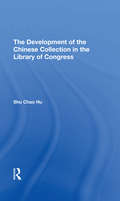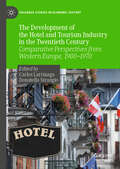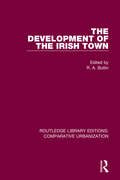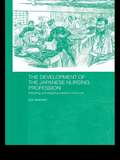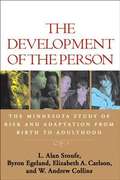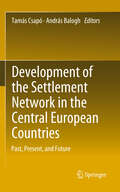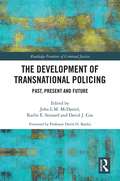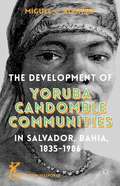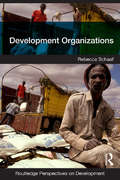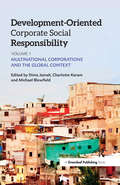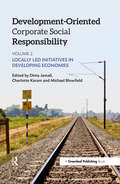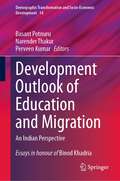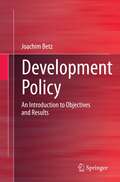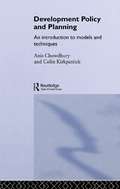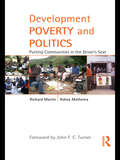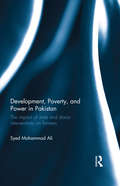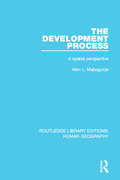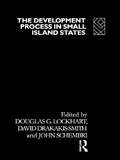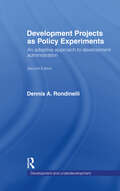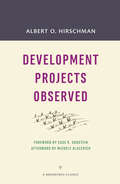- Table View
- List View
The Development Of The Chinese Collection In The Library Of Congress
by Shu Chao HuThis is the first comprehensive and in-depth study of the Chinese collection in the Library of Congress, the largest collection of its kind in the Western world. Started in 1869 with some 950 books received in the first exhange of publications between the United States and China, the collection has grown so steadily that in 1977 it numbered more than 430,000 volumes, including 2,000 rare Chinese items, some of which were printed in A.D. 975. In this primarily historical study, Professor Hu examines the social, cultural, and political forces that led to the development and growth of the collection, the acquisitions policies followed, and the sources of personal and financial support found within and outside the Library of Congress. He also explores the methods by which the library has built up several strong areas in the collection, particularly those of Chinese gazetteers, or local histories; ts’ung-shu, or collections of reprints; and rare works.
The Development of the Cultural Industry in China: Theories, Policies, and Strategies (China Connections)
by Huilin HuThis volume addresses the rapid growth of China’s cultural industry and its significant cultural and economic impact on the country. It considers what exactly constitutes the cultural industry, defining the basis for discussions on issues as the internal tensions constraining China’s cultural industry development. It examines the place of culture and cultural industry in relation to China’s overall development, and what kinds of strategies, policies and concrete measures are most effective in promoting the industry’s growth, exploring the role of Government in Cultural Industrial Development.
The Development of the Hotel and Tourism Industry in the Twentieth Century: Comparative Perspectives from Western Europe, 1900–1970 (Palgrave Studies in Economic History)
by Carlos Larrinaga Donatella StrangioThis edited collection explores the pivotal role of the hotel industry in building Western Europe’s tourism economy during the 20th century. The book brings together ten contributions focused on the same period, 1900-1970, to offer comparative perspectives from across the region including Italy, Switzerland, France, Spain and Britain. Drawing on historical case studies, chapters illuminate the different factors linking hotels and the broader tourism system including interventions of the public authorities and the State, the importance of private involvement, commercial strategies, the medium-term development of private hotels, hotel entrepreneurship, and the impact of economic crises and wars. By placing differing national approaches taken to the growth of the hotel industry in comparison, the book aims to fill a gap in the historiography of European hospitality and shed light on the wider impact of hotels and tourism on economic development at both a national and regional level. It will be of interest to a range of scholars, including in economic and business history, tourism studies, the history of tourism management, and social history.
The Development of the Irish Town
by R. A. ButlinOriginally published in 1977, and now with an updated new Preface, this volume covers the question of Irish urban origins in the pre-Norman period, the character and development of the medieval towns, the changing forms and functions of towns and cities in the early modern period. It also examines the substantial changes in size and form effected by population growth and town planning in the eighteenth and nineteenth centuries. Ireland’s urban history is unique and particularly interesting for the way it contrasts with developments in the urban history of western Europe. Unlike most west European regions, it was not colonised by the Romans.
The Development of the Japanese Nursing Profession: Adopting and Adapting Western Influences (Routledge Studies in the Modern History of Asia #Vol. 15)
by Aya TakahashiIn the years after 1868, when Japan's long period of self-imposed isolation ended, in nursing, as in every other aspect of life, the Japanese looked to the west. This book tells the story of 'Florence Nightingale-ism' in Japan, showing how Japanese nursing developed from 1868 to the present. It discusses how Japanese nursing adopted western models, implementing 'Nightingale-ism' in a conscious, caricature way, and implemented it more fully, at least on the surface, than in Britain. At the same time Japanese nurses had to cope, with great difficulty, with traditional Japanese attitudes, which were strongly opposed to women being involved in professions of any kind, and, as the book shows, western models did not in fact penetrate very deeply.
Development of the Person
by Byron Egeland L. Alan SroufeThe definitive work on a groundbreaking study, this essential volume provides a coherent picture of the complexity of development from birth to adulthood. Explicated are both the methodology of the Minnesota study and its far-reaching contributions to understanding how we become who we are. The book marshals a vast body of data on the ways in which individuals' strengths and vulnerabilities are shaped by myriad influences, including early experiences, family and peer relationships throughout childhood and adolescence, variations in child characteristics and abilities, and socioeconomic conditions. Implications for clinical intervention and prevention are also addressed. Rigorously documented and clearly presented, the study's findings elucidate the twists and turns of individual pathways, illustrating as never before the ongoing interplay between developing children and their environments.
Development of the Settlement Network in the Central European Countries
by András Balogh Tamás CsapóThis volume intends to summarize the most important changes in the Central European countries and their settlement network emphasizing the last 20 years since the collapse of the Iron Curtain.
The Development of Transnational Policing: Past, Present and Future (Routledge Frontiers of Criminal Justice)
by John L. M. McDaniel Karlie E. Stonard David J. CoxThis book draws together the insights of eminent academics and specialists to present an overview of past and present approaches to transnational policing throughout the Anglophone world. It aims to revitalize the study of transnational policing by showing that past and present developments in this field remain poorly understood, while also suggesting future avenues of research. Containing chapters on police history, police accountability, gendered hate crime in an increasingly online world, counter-radicalisation strategies being pursued around the world, internet-facilitated sex trafficking and changes in organised crime, amongst others, the authors adopt revisionist, orthodox and progressive views in order to challenge our understanding and appreciation of developments in transnational policing. All of the chapters in the book use policing models employed within the UK as either their focal point or as a point of comparison so that direct comparisons and contrasts can be examined. The Development of Transnational Policing illustrates distinctive and separate aspects of what remains an undoubtedly complex and dynamic field, but also forms an overview of developments and the dearth of academic research which surround them, in order hopefully to inspire researchers, policymakers and practitioners alike.
The Development Of Yoruba Candomble Communities In Salvador, Bahia, 1835–1986
by Miguel C. AlonsoThis project is an attempt to bring together the many fragments of history concerning the Yoruba religious community and their rise to prominence in Salvador, Bahia, Brazil, from the mid-nineteenth to the late-twentieth centuries.
Development Organizations (Routledge Perspectives on Development)
by Rebecca SchaafContinuing debates over the meaning of development and awareness of the persistence of poverty have resulted in increasing concern over how to ‘do’ development. There are growing numbers of development organizations, undertaking different activities, at different scales, with different motivations, and differing levels of success. It is necessary to identify and evaluate these varied organizations, in order to recognize their successes and failures. Development Organizations is the first introductory text to focus specifically on the variety of organizations involved in development policy and practice. It explores the range and role of organizations, including community-based organizations and civil society actors, international non-governmental organizations, state and other national-based actors, global forms of governance, international financial institutions and transnational corporations. The historical and contemporary role of each of these actors is considered, with analysis of complex theoretical debates surrounding their existence and their activities. The book also explores the political and contested nature of development activities promoted by these organizations, and their effects on society, the economy and the environment. These issues are also considered in context of the Millennium Development Goals; the agenda which currently impacts on the operation and outcomes of the broad range of development organizations. This invaluable text is richly complimented throughout with case studies to help illustrate the operations of development organizations; from the impact of multinational oil companies in the Niger delta to the impact of IMF reforms in Latin America and the Caribbean. This clearly written and user friendly text contains a wealth of features to assist student learning, including start of chapter learning outcomes, and end of chapter summaries, discussion topics, and suggestions for further reading and relevant websites.
Development-Oriented Corporate Social Responsibility: Multinational Corporations and the Global Context
by Michael Blowfield Charlotte Karam Dima JamaliGlobalization and the professionalization of Corporate Social Responsibility (CSR) have led to a surge of CSR activities claiming to support development across the globe. In this two volume series, the chapters explore this claim through nuanced debate about the potentialities, limitations and threats of development-oriented CSR in the developing world at both the global and local levels. Volume 1 explores whether there is a genuine possibility for corporations to contribute to development through CSR activities. With corporate reach spreading into every corner of the globe, this is a timely contribution presenting cases from developing countries spanning multiple continents. It explores the multi-level and multi-stakeholder dynamics involved in shaping the complex interface between multinational corporations (MNCs) and possibilities for CSR-related development. The chapters highlight the potential for MNCs to spread best practice and complement the role of governments in bridging governance gaps and spearheading capacity building efforts. But they also highlights serious reservations, stemming from isolated assessments, limited appreciation of the complexities of context, and the permeation of a northern agenda that marginalizes local voices.Within the larger debate on the merits and evils of globalization, this volume captures the mixed record of MNCs in promoting effective development in those parts of the world where it is most needed. This important series will be the reference source for academics, practitioners, policy-makers and NGOs involved in development-oriented CSR.
Development-Oriented Corporate Social Responsibility: Locally Led Initiatives in Developing Economies
by Dima Jamali Charlotte Karam Michael BlowfieldThis volume provides a platform for localized perspectives on CSR in developing countries across the globe. The chapters bring local context and business to the forefront and highlight the efforts spearheaded by indigenous actors from within the developing world. They present insights from developing countries through successful and less successful examples of locally-led CSR efforts. Together, these perspectives capture the complex paradoxes of CSR in developing countries and highlight common features in national institutions across the developing world, such as weak political and regulatory institutions, that shape local CSR initiatives and often limit its developmental impact.The editors argue the need to embrace partnership models that leverage the strengths of different actors to promote effective development and tackle the complex challenges facing the developing world. This important series will be the reference source for academics, practitioners, policy-makers and NGOs involved in development-oriented CSR.
Development Outlook of Education and Migration: An Indian Perspective (Demographic Transformation and Socio-Economic Development #14)
by Basant Potnuru Narender Thakur Perveen KumarThis book describes the movement of un-skilled and skilled workers both within and from India and its fallout on education and development. It furthers the evidence on the contribution of education and international migration in development with specific reference to India as a major source country of migrant population. The book also distinguishes the underlying linkages and distinction between international and internal migration on the one hand and the education and development experience on the other. It brings forth the causes and development experiences of both migrations to a common platform to gauge on their similarities and differences in the lens of education and development. As such, this book contributes to the scant literature on Indian experience of internal and international migration and sheds light on future migration policy and course correction necessary for places and countries of migrant origin.
Development Policy: An Introduction to Objectives and Results
by Joachim BetzDeveloping countries have made rapid but highly varied progress since the 1990s. So much so that the boundaries to the traditional industrialized countries have become partially blurred. On the other hand, there are a number of mostly fragile states that have not succeeded in doing so, or have only rudimentarily succeeded. Talk of one "Third World" and common development problems thus explains little. Instead, development has become a requirement for all states, which this textbook breaks down and assesses according to key development goals.This book is a translation of the original German 1st edition Entwicklungspolitik by Joachim Betz, published by Springer Fachmedien Wiesbaden GmbH, part of Springer Nature in 2021. The translation was done with the help of artificial intelligence (machine translation by the service DeepL.com). A subsequent human revision was done primarily in terms of content, so that the book will read stylistically differently from a conventional translation. Springer Nature works continuously to further the development of tools for the production of books and on the related technologies to support the authors.
Development Policy and Planning: An Introduction to Models and Techniques
by Anis Chowdhury Colin KirkpatrickReorientation from economic controls to a market-based approach led to significant changes in the economic policy of developing countries in the 1980s. Yet, with governments continuing to exercise economic management to accelerate growth beyond that achieved by market forces, techniques and models of development planning are still an integral feature of development policy management. Development Policy and Planning provides a non-technical explanation of the main techniques and models used for economic policy formulation. Each technique is illustrated in application through practical examples.
Development Poverty and Politics: Putting Communities in the Driver’s Seat (Routledge Studies in Development and Society)
by Richard Martin Ashna MathemaTop down . . . bottom up . . . what works? This book explores development from theperspective of the poor. Who are they? What lives do they live? What matters tothem? And most importantly, what can they do about it? Martin and Mathema debate how people can be given legitimate control of theirown environment, and how governments can work with them. How do communitiesand conditions drive behavior? What interventions are appropriate and how can weapproach development imaginatively? This is not about usurping governance – but revisiting structures that the developedworld has come to accept, and placing the power of decision in the hands of thepeople it affects. Nor it is about money . . . it’s about people, and about how we can make our worldwork for everyone.
Development, Poverty and Power in Pakistan: The impact of state and donor interventions on farmers (Routledge Contemporary South Asia Series)
by Syed Mohammad AliRural development remains a major challenge for governments of developing countries such as Pakistan. While a broad range of state and donor interventions impact the lives of poor farmers -who provide a significant proportion of the labour force - comprehensive consideration of these combined interactions remains inadequate. Focussing on Pakistan, this book discusses the political economy of agrarian poverty and underdevelopment in the region. The book provides an in-depth exploration of the combined impact of state and donor interventions, as well as that of resistance attempts, to alter the status quo within Pakistan. It questions the relevance of state institutions and policies contending with the problems of farmers in Pakistan, and how donor-led policies and programmes also influence their lives. It draws on findings that have emerged from interviews of over 200 respondents including government officials, donor agency representatives and different categories of poor farmers, during eleven months of fieldwork in the provinces of Sindh and Punjab. This research reveals some divergences between state and donor policies, but it finds more prominent convergences, which in turn enable the landed rural elite to benefit from market-based and capital-intensive processes of agricultural growth, without offering substantial opportunities for poor farmers. Reflecting the need to become less insular when discussing solutions to rural development, and demonstrating how state policies and institutions can interconnect with donor funded programmes, this book will be of interest to students and scholars of South Asian Politics and Development Studies.
Development, Poverty of Culture, and Social Policy
by Brij MohanThis book offers an interdisciplinary analysis of complex issues, constructs, and interventions that deal with human-social problems with global implications. It posits social development theory and practice in a critically important context challenging the scientific orthodoxy of our times.
Development, Power, and the Environment: Neoliberal Paradox in the Age of Vulnerability (Routledge Studies in Development and Society)
by Md Saidul IslamUnmasking the neoliberal paradox, this book provides a robust conceptual and theoretical synthesis of development, power and the environment. With seven case studies on global challenges such as under-development, food regime, climate change, dam building, identity politics, and security vulnerability, the book offers a new framework of a "double-risk" society for the Global South. With apparent ecological and social limits to neoliberal globalization and development, the current levels of consumption are unsustainable, inequitable, and inaccessible to the majority of humans. Power has a great role to play in this global trajectory. Though power is one of most pervasive phenomena of human society, it is probably one of the least understood concepts. The growth of transnational corporations, the dominance of world-wide financial and political institutions, and the extensive influence of media that are nearly monopolized by corporate interests are key factors shaping our global society today. In the growing concentration of power in few hands, what is apparent is a non-apparent nature of power. Understanding the interplay of power in the discourse of development is a crucial matter at a time when our planet is in peril — both environmentally and socially. This book addresses this current crucial need.
The Development Process: A Spatial Perspective (Routledge Library Editions: Human Geography)
by Akin MabogunjeWritten from the perspective of developing countries, this book discusses the development process from a spatial perspective, focussing particularly on the evoltuion of the intra-national space-economy. With emphasis on African nations, this book offers a distinctive interpretation of the current situation and policy prescriptions differing significantly from previous literature in the area.
The Development Process in Small Island States
by Douglas G. Lockhart David Drakakis-Smith John SchembriFirst Published in 2004. Routledge is an imprint of Taylor & Francis, an informa company.
Development Projects as Policy Experiments: An Adaptive Approach to Development Administration (Development and Underdevelopment Series)
by Dennis A. RondinelliInternational assistance programmes for developing countries are in urgent need of revision. Continuous testing and verification is required if development activity is to cope effectively with the uncertainty and complexity of the development process. This examines the alternatives and offers an approach which focuses on strategic planning, administrative procedures that facilitate innovation, responsiveness and experimentation, and on decision-making processes that join learning with action. A useful text for academics and practitioners in development studies, geography and sociology.
Development Projects as Policy Experiments: An Adaptive Approach to Development Administration (Development and Underdevelopment Series)
by Dennis A. RondinelliInternational assistance programmes for developing countries are in urgent need of revision. Continuous testing and verification is required if development activity is to cope effectively with the uncertainty and complexity of the development process. This examines the alternatives and offers an approach which focuses on strategic planning, administrative procedures that facilitate innovation, responsiveness and experimentation, and on decision-making processes that join learning with action. A useful text for academics and practitioners in development studies, geography and sociology.
Development Projects Observed
by Cass R. Sunstein Michele Alacevich Albert O. HirschmanOriginally published in 1967, the modest and plainly descriptive title of Development Projects Observed is deceptive. Today, it is recognized as the ultimate volume of Hirschman's groundbreaking trilogy on development, and as the bridge to the broader social science themes of his subsequent writings. Though among his lesser-known works, this unassuming tome is one of his most influential.It is in this book that Hirschman first shared his now famous "Principle of the Hiding Hand." In an April 2013 New Yorker issue, Malcolm Gladwell wrote an appreciation of the principle, described by Cass Sunstein in the book's new foreword as "a bit of a trick up history's sleeve." It can be summed up as a phenomenon in which people's inability to foresee obstacles leads to actions that succeed because people have far more problem-solving ability that they anticipate or appreciate.And it is in Development Projects Observed that Hirschman laid the foundation for the core of his most important work, Exit, Voice, and Loyalty, and later led to the concept of an "exit strategy."
Development Projects Observed
by Cass R. Sunstein Albert O. Hirschman Michele AlacevichOriginally published in 1967, the modest and plainly descriptive title of Development Projects Observed is deceptive. Today, it is recognized as the ultimate volume of Hirschman's groundbreaking trilogy on development, and as the bridge to the broader social science themes of his subsequent writings. Though among his lesser-known works, this unassuming tome is one of his most influential.It is in this book that Hirschman first shared his now famous "Principle of the Hiding Hand." In an April 2013 New Yorker issue, Malcolm Gladwell wrote an appreciation of the principle, described by Cass Sunstein in the book's new foreword as "a bit of a trick up history's sleeve." It can be summed up as a phenomenon in which people's inability to foresee obstacles leads to actions that succeed because people have far more problem-solving ability that they anticipate or appreciate.And it is in Development Projects Observed that Hirschman laid the foundation for the core of his most important work, Exit, Voice, and Loyalty, and later led to the concept of an "exit strategy."
